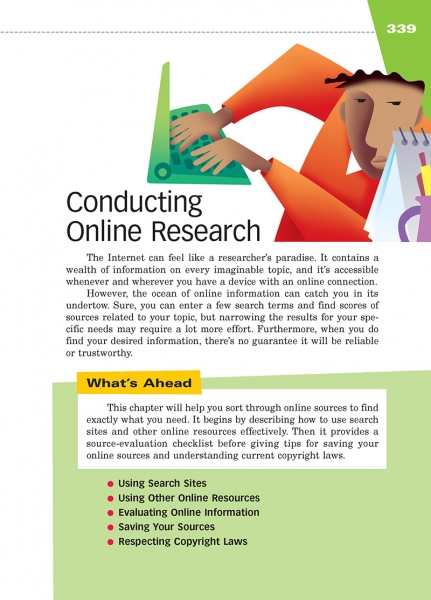Page 339 from

Start-Up Activity
Start talking about a recent movie that you have seen. Say something about the producer of the movie without giving the person's name. "What's his/her name?" Allow students to use their phones or computers to look up the name. Thank those who find it. Then talk about some other obscure aspect of the movie, for example, the score, "Who composed that?" or the costumes, "Who designed those?" Ask students to find out for you. Then wonder aloud how much the movie has grossed in the U.S. and internationally. If your students are like most, they will take delight in hopping online to find the answers.
Let them know that, before the Internet, people wandered around in ignorance for weeks or months with no easy way of finding answers. The Internet puts answers at our fingertips. However, not all information on the Internet is reliable, and some of the best stuff is hardest to find. This chapter will help students find excellent, reliable information on the Internet.
Think About It
“The internet has been a boon and a curse for teenagers.”
—J. K. Rowling

Start-Up Activity
Start talking about a recent movie that you have seen. Say something about the producer of the movie without giving the person's name. "What's his/her name?" Allow students to use their phones or computers to look up the name. Thank those who find it. Then talk about some other obscure aspect of the movie, for example, the score, "Who composed that?" or the costumes, "Who designed those?" Ask students to find out for you. Then wonder aloud how much the movie has grossed in the U.S. and internationally. If your students are like most, they will take delight in hopping online to find the answers.
Let them know that, before the Internet, people wandered around in ignorance for weeks or months with no easy way of finding answers. The Internet puts answers at our fingertips. However, not all information on the Internet is reliable, and some of the best stuff is hardest to find. This chapter will help students find excellent, reliable information on the Internet.
Think About It
“The internet has been a boon and a curse for teenagers.”
—J. K. Rowling